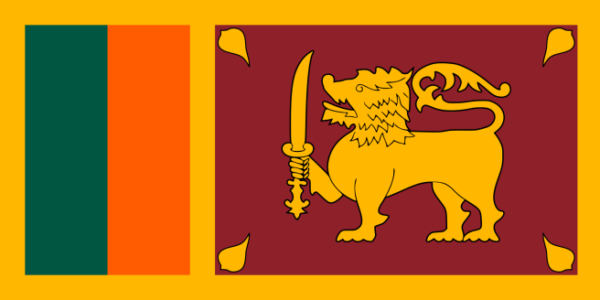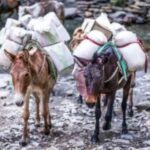SRI LANKA NEWS (NOVEMBER 2024) – Compiled by Victor Melder.

 A team of researchers has discovered a new plant species in Sri Lanka’s central highlands, scientifically named Coleus hakgalensis Abeysekara, Kasunika, Haluwana & Nilanka sp. nov. This unique discovery was made by the National Herbarium staff as part of the national plant discovery programme, which has been ongoing since 2013. Sumedha Abeysekara, O.M. Kasunika, Nishanthi Haluwana, and Nadun Nilanka played a key role in identifying this new species, which belongs to the Coleus genus within the Lamiaceae family. The National Botanic Gardens Department and the National Herbarium discovered the plant in February 2024 during botanical research conducted in the Hakgala region of the Nuwara Eliya District.The discovery was featured in Phytotaxa, a leading international journal on plant taxonomy and classification. (Ceylon Today, 1.11.2024)
A team of researchers has discovered a new plant species in Sri Lanka’s central highlands, scientifically named Coleus hakgalensis Abeysekara, Kasunika, Haluwana & Nilanka sp. nov. This unique discovery was made by the National Herbarium staff as part of the national plant discovery programme, which has been ongoing since 2013. Sumedha Abeysekara, O.M. Kasunika, Nishanthi Haluwana, and Nadun Nilanka played a key role in identifying this new species, which belongs to the Coleus genus within the Lamiaceae family. The National Botanic Gardens Department and the National Herbarium discovered the plant in February 2024 during botanical research conducted in the Hakgala region of the Nuwara Eliya District.The discovery was featured in Phytotaxa, a leading international journal on plant taxonomy and classification. (Ceylon Today, 1.11.2024)
Sri Lanka has reached a significant milestone, surpassing 1.6 million tourist arrivals for the year, with over 117,000 visitors registered in the first 27 days of October. Despite this positive momentum, industry stakeholders believe the numbers could have been higher if not for recent challenges, including visa processing delays and travel advisories from foreign missions warning of potential security threats in Arugam Bay.The Sri Lanka Tourism Development Authority (SLTDA) had initially targeted 2.3 million arrivals for 2024, based on the benchmark set in 2018, along with a projected revenue of $ 4.5 billion. However, SLTDA Chairman Buddhika Hewawasam recently suggested that these expectations were overly optimistic given current circumstances. Instead, Hewawasam now anticipates 2 million arrivals and just over $ 3 billion in revenue by year’s end. Tourist arrivals in October were on an upward trajectory during the first three weeks, with 29,815 visitors in the first week, 30,103 in the second, and 30,751 in the third. However, arrivals fell to 26,472 between 22-27 October following a security advisory issued by Colombo-based embassies, which warned of a potential threat in Arugam Bay. India continues to be the largest source market, contributing 32,097 tourists or 27.4% of October’s arrivals, followed by the UK with 9,113 visitors (7.8%) and China with 7,609 tourists (6.5%). Despite the challenges, Sri Lanka’s tourism industry is performing better than in the past five years, with $ 2.34 billion in revenue generated during the first nine months of 2024 — a 61.2% increase over the same period last year. Looking ahead, the new administration of the SLTDA has set an ambitious five-year target to attract 5 million tourists and generate $ 8.5 billion in revenue, driven by consistent annual growth. (Financial News, 1.11.2024)
President Anura Kumara Dissanayake stated that Ministers in the upcoming Parliament will not be provided housing in Colombo. The President said so while participating in a public rally organised by the National People’s Power in Matara. President Anura Kumara Dissanayake further said a Cabinet of less than 25 Ministers will be formed after November 14. Not only that, but also privileges given to Ministers will be cut in a large amount with the aim of transforming them into public servants. The Cabinet will definitely consist of a group that has experience and understanding in each subject. After that, we will form a mechanism where the other MPs who will be elected to Parliament can give their contribution to these Ministries voluntarily. After November 14, a Cabinet and a government will be formed in which every MP becomes a link in the role of building this country. There are a number of problems locally. Who is looking after the problems in the villages? Members of the local government authorities are aware of the flood threats in their areas and they also have the solutions for them.So we need to get their contribution for these national needs. In order to provide solutions to the problems of the people, people’s leaders who are close to the people of a district should be formed. “We need a government that connects with the people directly,” he said, stressing that leaders must work in their districts to address local issues rather than remaining distant. “We don’t need leaders elected from villages and staying in Colombo. That is why no Minister will be given housing in Colombo. The government does not provide housing. Elected leaders should frequently come to their villages and look into the problems of their villagers. The country’s development programme should be implemented with the people. We are building a government suitable for that purpose. Governments like this have not been formed in Sri Lanka in the past. Everyone should be made a part of Sri Lanka’s development. For that, we request you to give us strong power on November 14. (Daily News, 1.11.2024)
Since 2023, over 80 medical officers and 15 specialists had left the Karapitiya Teaching Hospital, said Director of the hospital Dr. S.P.U.M. Ranga, on Thursday (31). Dr. Ranga attributed the situation to economic problems, etc. He also noted a shortage of specialist doctors in the hospital’s paediatric and forensic medicine departments. Dr. Ranga however assured that the hospital’s operations and patient care services were continuing uninterrupted. (Daily Island, 2.11.2024)
Prof. Anil Jayantha claimed that the majority of debt borrowed (86%) between 27 September and 15 October was used to service existing debt obligations. Between 27 September and 15 October, the Government raised Rs. 461.5 billion through three Treasury bill auctions and an additional Treasury bond. This closely aligns with the Rs. 465.1 billion figure cited by Prof. Jayantha.
Debt servicing during this period included Rs. 390.9 billion for maturing Treasury bills and Rs. 22 billion in bond coupon payments, totalling Rs. 412.9 billion. This means around 89% of the new debt issued was allocated to debt servicing, which is close to the figure quoted by the professor.
In sum, although there are slight differences in the exact numbers, the professor’s overall claim – that over 85% of the debt issued was for debt servicing – is correct. Therefore, we classify the statement as TRUE. (Financial Times, 5.11.202.
President Anura Kumara Dissanayake stated that Ministers in the upcoming Parliament will not be provided housing in Colombo, he further said a Cabinet of less than 25 Ministers will be formed after November 14. Not only that, but also privileges given to Ministers will be cut in a large amount with the aim of transforming them into public servants. The Cabinet will definitely consist of a group that has experience and understanding in each subject. After that, we will form a mechanism where the other MPs who will be elected to Parliament can give their contribution to these Ministries voluntarily. After November 14, a Cabinet and a government will be formed in which every MP becomes a link in the role of building this country. There are a number of problems locally. Who is looking after the problems In the villages? Members of the local government authorities are aware of the flood threats in their areas and they also have the solutions for them .So we need to get their contribution for these national needs. In order to provide solutions to the problems of the people, people’s leaders who are close to the people of a district should be formed. “We need a government that connects with the people directly,” he said, stressing that leaders must work in their districts to address local issues rather than remaining distant. “We don’t need leaders elected from villages and staying in Colombo. That is why no Minister will be given housing in Colombo. The government does not provide housing. Elected leaders should frequently come to their villages and look into the problems of their villagers. The country’s development program should be implemented with the people. We are building a government suitable for that purpose. Governments like this have not been formed in Sri Lanka in the past. Everyone should be made a part of Sri Lanka’s development. For that, we request you to give us strong power on November 14. (Daily News 5.11.2024)
Nearly 2,000 Sri Lankans have lost their lives in road accidents from 1 January to 25 October, according to Police Spokesman, DIG Nihal Thalduwa. He said 1,818 fatal accidents occurred during this period, resulting in 1,898 deaths across the country, of which, 676 were pedestrians. In 2023, Sri Lanka recorded 2,557 fatalities in 2,200 fatal trafficaccidents. The Police have launched an investigation to determine whether a recent fatal bus accident on Dunhinda Road in Badulla was caused by a technical fault with the bus or driver error. The incident involved a bus carrying students from the Southern Campus of the General Sir John Kotelawala Defence University (KDU), which toppled across the road, resulting in the deaths of two female students and injuries to 40 others. Senior Superintendent of Police (SSP) Wasantha Kandewatta, who oversees the Badulla area, stated that the investigation awaits a Government Analyst’s Report on the bus. Preliminary investigations suggest that the driver may have been operating the vehicle in third or fourth gear at the time of the accident. Police suspect that excessive speed on the steep, winding four-kilometre stretch of road may have caused the bus to skid out of control. To determine the exact cause, the Police are examining both potential technical malfunctions and driver-related factors. SSP Kandewatta noted that efforts are also underway to analyse data regarding the bus’s operation at the time of the incident, including any technological evidence that could indicate its speed and gear usage. Dash cam footage from a car has emerged, showing the bus speeding shortly before the accident occurred. Of the 40 injured passengers, six have been discharged from Badulla Teaching Hospital, while seven others remain in the Intensive Care Unit, with medical teams continuing to monitor their conditions closely. (Ceylon Today, 5.11.2026)
The deficit in the trade account widened to US dollars 4,200 mn during the nine months ending September 2024 from US dollars 3,341 mn in the corresponding period of 2023, the Weekly Economic Indicators report of the Central Bank of Sri Lanka states. “Earnings from exports increased by 6.0 per cent (year-on-year) to US dollars 9,518 mn during the nine months ending September 2024 as a result of increased earnings mainly from exports of petroleum products (111.0%), textiles and garments (2.6%), food, beverages and tobacco (19.2%), rubber products (10.7%), tea (7.0%), and coconut related products (20.0%), among others,” it states. Import expenditure increased by 11.3 per cent (year-on-year) to US dollars 13,718 mn during the nine months ending September 2024, mainly due to higher imports of textiles and textile articles (18.2%), machinery and equipment (22.9%), chemical products (25.7%), and building material (25.3%), among others. The export unit value index declined by 5.6 per cent, (year-on-year), in September 2024 mainly due to lower prices recorded in exports of industrial goods. The import unit value index in September 2024 declined by 4.4 per cent, (year-on-year), due to lower prices recorded in intermediate goods. Accordingly, the terms of trade deteriorated by 1.2 per cent, (year-on-year) to 85.2 index points in September 2024. The average price of tea in the Colombo auction increased to US dollars 4.09 per kg in September 2024 from US dollars 3.63 per kg in September 2023. On year-on-year basis, Colombo Consumer Price Index (CCPI) based headline inflation remained in the negative territory for the second consecutive month, recording a deflation of 0.8 per cent in October 2024 compared to 0.5 per cent in September 2024. Food category recorded an inflation of 1.0 per cent, while the Non-Food category recorded a deflation of 1.6 per cent. Further, the CCPI based core inflation moderated to 3.0 per cent in October 2024 from 3.3 per cent in September 2024. In September 2024, Purchasing Managers’ Index for Construction, as reflected by the Total Activity Index, indicated a contraction in construction activities, on a month-on-month basis. At the start of the period from 26th October to 01st November, 2024, oil prices fell on signs of de-escalation of geopolitical tensions in the Middle East. However, prices picked up again towards the end of the week on concerns about retaliatory attacks. Overall, Brent and WTI prices rose by US dollars 0.36 and US dollars 1.96 per barrel, respectively, over the period. Weekly Average Weighted Prime Lending Rate (AWPR) for the week ending 01st November 2024 decreased by 12 bps to 9.05 per cent compared to the previous week. The Average Weighted Call Money Rate (AWCMR) recorded as 8.55 per cent on 01st November 2024 compared to 8.57 per cent at the end of the last week. The reserve money decreased compared to the previous week mainly due to a decrease in the currency in circulation and deposits held by the commercial banks with the Central Bank. The total outstanding market liquidity was a surplus of Rs. 80.050 bn by 01st November 2024, compared to a surplus of Rs. 86.268 bn by the end of the last week. The gross official reserves were provisionally estimated at US dollars 5,994 mn as at end September 2024. This includes proceeds from the People’s Bank of China (PBOC) swap arrangement, which is subject to conditionalities on usability. (Daily Island, 4.11.2024)
Sri Lanka has been voted as the “Most Desirable Island in the World” according to the results for the 23rd Annual Wanderlust Reader Travel Awards. According to the travel magazine ‘Wanderlust’, Sri Lanka has risen from last year’s eighth place to take Gold in one of the Awards’ most thrilling turnarounds. Destinations, tour operators and travel brands have been recognised across 22 categories, including the Most Desirable Countries and Cities in Europe and around the world at the 23rd Annual Wanderlust Reader Travel Awards. “Known as the ‘Pearl of the Indian Ocean’, the nation’s history comes to life through spectacular monuments such as Sigiriya Rock, the cave temples of Dambulla and the ancient ruins of Anuradhapura and Polonnaruwa. “Elsewhere, its leopard-filled national parks and the jungle-fringed beaches of Tangalle and Trincomalee show off the island’s natural side. But, more recently, it’s the tea plantations and lush highlands of the centre that have caught the eye, with the fresh addition of the Pekoe Trail offering an exciting new way to explore Sri Lanka’s green heart,” (Daily Mirror, 7.11.2024)
Sri Lanka’s national tea sales average for October declined to Rs. 1,172.15 (US$ 4.02) per kilogram, down by Rs. 35.84 and US$ 0.02 compared with September’s Rs. 1,207.99 (US$ 4.04), according to data from the Sri Lanka Tea Board. Despite the month-on-month drop, the October average marked a year-over-year increase of Rs. 44.01 and US$ 0.53 from Rs. 1,128.14 (US$ 3.49) in October 2023. High-grown teas recorded a month-on-month rise, with an increase of Rs. 6.67 and US$ 0.12, while year-over-year figures showed gains of Rs. 125.60 and US$ 0.77. Medium-grown teas posted a monthly decline of Rs. 23.46 in rupee terms, though dollar value rose by US$ 0.01, and a year-over-year increase of Rs. 42.88 and US$ 0.47. Low-grown teas saw declines in both rupee and dollar terms on a monthly basis, down by Rs. 49.34 and US$ 0.06, but registered a year-over-year increase of Rs. 14.19 and US$ 0.46. Cumulative results from January to October 2024 show that all tea elevations recorded positive variances in both rupee and dollar terms compared with the corresponding period in 2023. (Daily Mirror,8.11.2024
Worker remittances for October continued to come in stronger against both a month ago as well as a year ago period helping both the foreign currency reserves and the rupee to remain strong. Sri Lankans working abroad sent back US$ 587.7 million in October, just ahead of the year end festive season which usually sees a further bump up in the monies that the country typically receives. What the country received in October is compared with US$ 555.6 million in September 2024 and US$ 517.4 million received in the same month last year, reflecting the strength of the inflow. The October receipts brought the total earnings received from remittances to US$ 5,431.5 million, up 11.7 percent from the same period last year, and also bringing the full year income at a striking distance from the once elusive US$ 7.0 billion. The last time Sri Lanka was able to surpass the US$ 7.0 billion income mark from remittances was back in 2020 and then the inflow faltered, causing the economy to sputter by early 2022. The continued strength in remittances and the tourism inflows, helped the country’s Central Bank to purchase US$ 189.5 million from the domestic foreign currency market, a fairly large amount for a single month and extend its months-long streak in remaining a net buyer of foreign currency. This helped the country to further bolster its gross official reserves which rose to US$ 6,467 million from US$ 5,994 million by the end of September.These strong inflows amid the debt standstill on most of the foreign currency debt repayments also helped the country to strengthen the rupee against the dollar. The rupee has appreciated by 10.7 percent year-to-date on top of a 12 percent gain in value in 2023. Remittances have not only helped the country to regain the external sector strength but also to partly reverse much of inflationary pressures seen during the last two years, by easing prices of imported goods. Sri Lanka, going forward should be able to collect well over US$ 7.0 billion from remittances as a large number of people left the country in the last two years, seeking better jobs and living conditions elsewhere and they will send part of their earnings to help support their families back home. (Daily Mirror, 11.11.2024)
Despite travel warnings against ‘would be’ incidents in Arugam Bay allegedly targeting Israeli tourists, earnings from tourism passed the USD 2.5 billion mark from 2024 January to end October showing a huge 59% increase as against the corresponding period of 2023 which was USD 1,593.4 million. Arrivals too soared to 1,620,715 from January to end October2024 also showing a notable 44% increase as against the same period in 2023 which was recorded at 1,125,455. Earnings from tourism amounted to USD 185.6 million in October 2024, compared to USD 181 million in September 2024 and USD 136.7 million in October 2023.(Daily News 11.11.2024)
A total of 2,000 incidents of cyberbullying have been reported so far this year, according to the Sri Lanka Computer Emergency Readiness Team (SLCERT). SLCERT engineer Charuka Damunupola, while speaking to the Daily Mirror revealed that there has been a significant rise in cybercrime activities, with over 9,500 complaints filed in recent months. He stated that 981 of these cases involved sexual abuse, highlighting the growing concerns over online safety, particularly for vulnerable individuals. In addition to cyberbullying, reports show that nearly 1,600 incidents have been reported involving internet scams, further stressing the escalating threat posed by cybercriminals. The surge in cybercrime cases underscores the urgent need for stronger measures to tackle digital harassment and protect online users, especially children and other vulnerable groups. Meanwhile, experts have called for more robust laws and enforcement, alongside greater awareness campaigns, to safeguard Sri Lanka’s digital space. (Daily Mirror, 12.11.2024)
It has been decided to hold a three-day workshop regarding the parliamentary system for the newly elected members of the 10th Parliament. Acting Secretary General of Parliament Chaminda Kularathne said this workshop will be held on November 25, 26 and 27.Also, the registration of new MPs be carried out from November 18 to 20. Due to these activities, the leave of Parliament employees have also been cancelled from November 18 to 22. The new parliamentary session is scheduled to meet on November 21 at 10 am. (Daily Mirror, 17.11.2024)
President Anura Kumara Dissanayake’s National People’s Power (NPP) coaliton scored a two-thirds majority in parliament by winning 159 seats at Thursdays [14] parliamentary election. Dissanayake, who was elected in September, needed a clear majority to deliver his promise to combat corruption and restore stability after the island’s worst-ever economic crisis. The high cost of living was one of the key issues for many voters. Analysts had expected the NPP to do well in the elections but what remained to be determined was the margin of victory, and whether it would get the two-thirds majority it wanted to be able to pass its ambitious reforms. In the outgoing assembly, Dissanayake’s Janatha Vimukthi Peramuna (JVP) party, which now leads the NPP, had just three seats. The 55-year-old earlier told reporters that he believed this was “a crucial election that will mark a turning point in Sri Lanka”.. Dissanayake called for snap elections shortly after he became president to seek a fresh mandate to pursue his policies. There was “no point continuing with a parliament that is not in line with what the people want”, he had said. Nearly two-thirds of former MPs had chosen not to run for re-election, including prominent members of the former ruling Rajapaksa dynasty. Out of the 225 seats in the parliament, 196 MPs were directly elected. The rest were nominated by parties based on the percentage of votes they get in what is known as proportional representation. High inflation, food and fuel shortages precipitated a political crisis in 2022 which led to the ousting of President Gotabaya Rajapaksa. His successor Ranil Wickremesinghe managed to negotiate a bailout package worth $3bn with the International Monetary Fund – but many Sri Lankans continue to feel economic hardship. The number of people living below the poverty line in Sri Lanka has risen to 25.9% in the past four years. The World Bank expects the economy to grow by only 2.2% in 2024. Disenchantment with established political players greatly helped the left-leaning Dissanayake during September’s election. His party has traditionally backed strong state intervention and lower taxes, and campaigned for leftist economic policies. Dissanayake made history as Sri Lanka’s first president to be elected with less than 50% of the vote. Many observers think his alliance will do better this time. How his alliance fares will be partly due to a fragmented opposition – with many leaders and parties breaking away into either smaller groups, or contesting as independent candidates. Observers say the JVP-led alliance ran a more vibrant campaign than the opposition. The coalition will now be under massive pressure to perform and live up to their campaign promises. Dissanayake has promised to repay the country’s debt, reform its political culture, and punish members of past administrations for corruption. Sri Lanka’s economic situation remains precarious – and the main focus is still on providing essential goods and services. How the country progresses from this point will be a real challenge for the new government. (Daily Mirror, 15.11. 2024)
A large number of powerful former Government and Opposition MPs, many of whom have been long-standing figures in Parliament, faced major setbacks in the 2024 Parliamentary Election, failing to secure their seats due to the National People’s Power (NPP) party’s landslide victory. Notably, all Cabinet Ministers from former President Ranil Wickremesinghe’s Government who contested in the election were among those unseated. In Colombo, United National Party (UNP) stalwart Sagala Ratnayake was unable to secure a seat under the National Democratic Front (NDF) ticket, while former Colombo Mayor Rosy Senanayake was also denied the chance to enter Parliament. Former Ministers Susil Premajayantha, Vidura Wickramanayake and Rear Admiral Sarath Weerasekara also failed to secure a Parliamentary seat. Among others who will not be returning to Parliament from previous regime include; Manusha Nanayakkara and Dr. Ramesh Pathirana who both contested from the Galle Electoral District under the National Democratic Front (NDF) banner. Former Minister Harin Fernando, who joined Wickremesinghe’s Government having crossed over from the Samagi Jana Balawegaya (SJB) lost out to former MP Chamara Sampath who secured the only seat obtained by the NDF in Badulla. Veteran politician and former Minister Mahinda Amaraweera who contested from the Hambantota District also failed to secure a seat in Parliament. Former Minister Kanchana Wijesekara who was in charge of resolving Sri Lanka’s energy crisis also suffered a similar fate in the Matara Electoral District. Sri Lanka Podujana Peramuna (SLPP) MP and Rajapaksa family member Nipuna Ranawaka was also defeated in Matara while his cousin Shasheendra Rajapaksa suffered a crushing loss after contesting in his strong hold, the Monaragala Electoral District. Former State Ministers Premitha Bandara Tennakoon and Rohana Dissanayaka who contested from the Matale District were unable to secure seats in Parliament as well. The Sri Lankan Parliament will also not see the return of many other prominent MPs including Nimal Siripala de Silva, Roshan Ranasinghe, Duminda Dissanayake, S.M. Chandrasena, Johnston Fernando, Pvaithra Wanniarachchi, Arundika Fernando, Premalal Jayasekara, Udaya Gammanpila, Mahindananda Aluthgamage, Sivanesathurai Santhirakanthan, Dr. Rajitha Senaratne, Piyal Nishantha, Prasanna Ranaweera, Channa Jayasumana and Nimal Lansa. Many powerful Opposition MPs also suffered significant losses. These include Douglas Devananda and M.A. Sumanthiran in the North as well as Buddhika Pathirana, Hirunika Premachandra, Eran Wickramaratne, Earl Gunasekara, Wasantha Yapa Bandara, and Tissa Attanayake in the South. (Financial Times, 16.11.2024)
The new Cabinet of Ministers of the National People’s Power (NPP) government were sworn in before President Anura Kumara Dissanayake, a short while ago. The swearing-in ceremony was held at the Presidential Secretariat in Colombo this morning (18). The new Cabinet of Ministers comprises of 21 Ministers including the Prime Minister while the new Deputy Ministers will reportedly be appointed later on. Accordingly, the new Cabinet will be limited to 21 Ministers, whereas President Anura Kumara Dissanayake will retain the ministerial portfolios of Defence, Finance, Economic Development and Digital Economy, according to the President’s Media Division (PMD). The Cabinet Ministers of the new government are as follows: PM Dr. Harini Amarasuriya – Minister of Education, Higher Education and Vocational Education, Vijitha Herath – Minister of Foreign Affairs, Foreign Employment and Tourism , Prof. Chandana Abeyrathna – Minister of State Administration, Provincial Councils and Local Government, Harshana Nanayakkara – Minister of Justice and National Integratio, Saroja Savithri Paulraj – Minister of Women and Child Affairs, K.D. Lalkantha – Minister of Agriculture, Livestock, Land and Irrigation, Anura Karunathilake – Minister of Urban Development, Construction and Housing, Ramalingam Chandrasekar – Minister of Fisheries, Upali Pannilage – Minister of Rural Development, Social Security and Community Empowerment, Sunil Hadunnetti – Minister of Industries and Entrepreneurship Development, Ananda Wijepala – Minister of Public Security and Parliamentary Affairs, Bimal Rathnayake – Minister of Transport, Highways, Ports and Civil Aviation, Hiniduma Sunil Senevi – Minister of Buddha Sasana, Religious and Cultural Affairs, Dr. Nalinda Jayatissa – Minister of Health and Mass Media, Samantha Vidyarathna – Minister of Plantation and Community Infrastructure, Sunil Kumara Gamage – Minister of Sports and Youth Affairs, Wasantha Samarasinghe – Minister of Trade, Commerce, Food Security and Cooperative Development, Prof. Chrishantha Abeysena – Minister of Science and Technology, Prof. Anil Jayantha Fernando – Minister of Labour, Kumara Jayakody – Minister of Energy,Dr. Dammika Patabendi – Minister of Environment (Ada Derana News, 18.11.2024)
Thirty percent of children are nearsighted due to prolonged use of digital screens, and the World Health Organisation predicts that this figure will rise to 50 percent by 2050, Lady Ridgeway Children’s Hospital (LRH) Ophthalmologist Dr. Anusha Thennekumbura said. Speaking at the Health Promotion Bureau, experts said the importance of monitoring children’s eye health and seeking timely treatment to prevent long-term complications. Dr. Swarna Wijetunga, a child and adolescent psychologist at the LRH, highlighted that excessive screen use not only causes eye issues but also contributes to malnutrition and overnutrition, often linked to using screens during feeding times. She warned that this reliance on digital devices compromises children’s development and well-being. Guidelines suggest no screen time for children under 18 months and a maximum of one hour daily, with parental supervision for those aged 18 months to 2 years. Dr. Wijetunga also noted a shift in focus, where parents are now being advised to spend quality time playing with their children rather than relying on screens for convenience. (Daily Mirror, 21.11.2024)
Deegadanthu 1, the only remaining Sri Lankan tusker with the largest pair of tusks, died from electrocution yesterday (28) morning. The tusker, aged between 40 to 50 years, was well known to frequent the Kalawewa National Park and the Kahalla-Pallekelle forest reserve. The tusker has been electrocuted after coming into contact with an unauthorized electric fence fixed near a house in the Hinguru Wewa area in Palagala, Aadiyagala in the Galkiriyagama Police Division, Police said. Deegadanthu 1, the oldest and the last tusked elephant of the four Kalawewa tusker family, who lived in the centre of the Kala Wewa National Park as his home has been considered as a jewel for Sri Lanka in the eyes of the world. The four tuskers Revatha, Barana, Deegadanthu 1 and Deegadanthu 2 lived in the Kala Wewa reserve and the surrounding area making it their home. Environmentalists have pointed out that it is believed that Deegadanthu 2 died after previously being attacked by another elephant. (Daily News, 29.11.2024)
Twelve people have died and two persons are missing with 17 injured due to the bad weather that has affected the country, the Disaster Management Centre (DMC) said yesterday. The adverse weather condition has affected 227 Divisional Secretariat divisions in all 24 districts of the country. Currently, 401,707 people belonging to 120,534 families are affected by the disaster. Accordingly, 345 safe centres have been built across the island, and 36,330 people belonging to 11,663 families are temporarily staying in them. Also, 94,134 people belonging to 28,324 families are in relative houses, said the DMC. Most of the reported disaster deaths occurred in the Eastern Province, of which eight were in the Ampara district. The prevailing turbulent weather in the country has broken 106 small tanks across the country due to heavy rains. The Vavuniya Nedunkulama dam has also broken due to incessant rains. Also, dams of 30 small tanks in the district have been broken. Meanwhile, due to the bad weather, 102 houses have been completely damaged and 1,952 houses have been partially damaged, according to the DMC. In the meantime, due to the turbulent nature of the sea area around the Bay of Bengal, the amount of dust particles in the atmosphere in the country has also increased remarkably. As a result, the sky above Colombo city as well as other parts of the country is seen cloudy and foggy. The air quality index in Colombo, Anuradapura, Polonnaruwa and Jaffna has exceeded the level of 150 which is harmful to the human body according to the Central Environmental Authority. Also, the air quality index in all districts except Nuwara-Eliya has exceeded 100 which is slightly harmful to the human body. Those who are having breathing difficulty issues due to this situation are advised to seek medical help. The Railway Department stated that the night mail train running between Colombo Fort and Badulla was restricted to Bandarawela yesterday due to adverse weather conditions. The flood warnings issued due to the rising water levels of Mundeni Aru, Mahawelia River, Heda Oya and Deduru Oya have been extended for the next 48 hours. Minor floods have been reported in Horowpathana due to a rise in the water levels of Yan Oya, and in Thanthirimale due to Malwathu Oya, and in Moragaswewa due to Deduru-Oya. (Daily News, 29.11.2024
According to the real-time Air Quality Index (AQI), the air pollution level indicated in Sri Lanka’s atmosphere is still at risk and the country will experience unhealthy air quality conditions. Jaffna, Kilinochchi, Trincomalee, Puttalam, Dambulla, Matale, Negombo, Kandy, Colombo, Ratnapura, Ambalangoda, and Galle also indicated to have unhealthy air pollution level . Reports said these regions will experience unhealthy air quality conditions that people with respiratory complications are advised to take precautions like wearing mask and being inside. Meanwhile, Batticaloa, Mahiyangana, Moneragala, Hulandawa, Hungama indicate an unhealthy level in which some pollutants may be present and a health concern for a very few people who are unusually sensitive to air pollution. Nuwara Eliya and Diyathalawa were designated as having moderate air pollution (acceptable air quality). Air Quality Indexes (AQIs) provide a measure of air pollution levels, categorized by health impacts. The US AQI, widely used globally, ranges from 0 to 500, with lower values indicating better air quality. Levels are divided into six categories, from “Good” (0-50) to “Hazardous” (301-500), based on pollutants like PM2.5, PM10, ozone, and NO₂. (Daily Mirror, 30.11.2024)
A 41-year-old naval officer attached to the Punewa Navy camp was killed in a wild elephant attack last night, Police said. The victim is identified as a Lieutenant Commander of the Sri Lanka Navy and a resident of Nittambuwa. Investigations revealed that the naval officer had come under the elephant attack while he was returning to the camp after purchasing a packet of meal from a nearby shop. He was pronounced dead on admission to the Vavuniya Hospital. (Daily Mirror, 30.11.2024)
About 4,000 wild elephants have died in Sri Lanka during the last 14 years, according to Sameera Weeratunga of the Udawalawe Elephant Research project. He said so on Friday commenting on the death of tusker Deega Danthu 1. Deega Danthu 1 was electrocuted in Andiyagala when it got entangled in an illegally laid electric fence. Most of the elephant deaths are due to illegal human activity and 4,194 elephants have died in the past 14 years. The law is full of loopholes,” Weeratunga said, adding that in 2023 alone over 470 elephants had been killed. Weeratunga said over 200 elephants had died so far this year. “The national parks do not have adequate fodder for the animals and therefore they end up raiding homesteads. Their habitat is also being encroached on,” he said. (Daily Island, 30.11.2024)




















